jQuery是继prototype之后又一个JavaScript框架,是一个快速、简洁的JavaScript库,使用户能更方便的处理HTML documents、events、实现动画效果,并且方便地为网站提供AJAX交互;jQuery能够使用户的html页保持代码和内容分离,即不用再在html中插入一堆js来调用命令了,只需定义id即可。
什么是jQuery对象:
jQuery对象就是通过jQuery包装DOM对象后产生的对象;jQuery对象是jQuery独有的,如果一个对象是jQuery对象,那么它就可以使用jQuery里的方法:$("#test).html();即获取ID为test的元素内的html代码,等同于用DOM实现:document.getElementById("test").innerHTML;虽然jQuery对象是包装DOM对象后产生的,但是jQuery无法使用DOM对象的任何方法,同理DOM对象也不能使用jQuery里的方法。
约定:如果获取的是jQuery对象,那么要在变量前面加上$。
? ? ? ? var $variable = jQuery 对象
? ? ? ? var variable = DOM 对象
基本语法:$(selector).action():
使用jQuery需要先引入:? ?<script src="jquery-3.6.0.js"></script>
<html lang="en">
<head>
<meta charset="UTF-8">
<title>Title</title>
<script src="jquery-3.6.0.js"></script>
</head>
<body>
<div id="div1">11111</div>
<script>
//jQuery //这就是jQuery对象,可以简写为$,下面写法等同
alert(jQuery("#div1").html());
alert($("#div1").html());
</script>
</body>
</html>寻找元素(重要的选择器和筛选器):
选择器:
基本选择器:$("*") $("#id") $(".class") $("element") $(".class,p,div")
层级选择器:$(".outer div") $(".outer>div") $(".outer+div") $(".outer~div")
基本筛选器:$("li:first") $("li:eq(2)") $("li:even") $("li:gt(1)")
属性选择器:$('[id="div1"]') $('[alex="ss"][id]')
表单选择器:$("[type='text']")-------->$(":text")? ? ? 这只适用于input标签
? ? ? ? ? ? ? ? ? ? ? $("input:checked")
筛选器:
过滤筛选器:$("li").eq(2)? $("li").first() $("ul li").hasclass("test")
查找筛选器:$("div").children(".test")? $("div").find(".test")
? ? ? ? ? ? ? ? ? ? ? $(".test").next()? $(".test").nextAll()? $(".test").nextUntil()
? ? ? ? ? ? ? ? ? ? ? $("div").prev() $("div").prevAll() $("div").prevUntil()
? ? ? ? ? ? ? ? ? ? ? $(".test").parent()?$(".test").parents()??$(".test").parentUntil()
? ? ? ? ? ? ? ? ? ? ? $("div").siblings()
<html lang="en">
<head>
<meta charset="UTF-8">
<title>Title</title>
<script src="jquery-3.6.0.js"></script>
</head>
<body>
<div id="div1">hello div</div>
<div class="div"> hahhaha
<ul>
<li>11111</li>
<li>22222</li>
<li>33333</li>
<li>44444</li>
</ul>
</div>
<p class="p2">hello ppp</p>
<div class="outer">oooooooooooo
<div>哈哈哈哈或
<p class="pinner"> hello p outer</p>
</div>
<p class="pouter">hello ppppppppppp</p>
</div>
<p class="p3">hello pppppp33333</p>
<p class="p4">hello pppppp44444</p>
<p alex="bbb">uuuuuuu</p>
<p alex="www">rrrrrrrrr</p>
<input type="text">
<input type="button">
<script>
//基本选择器
$("*").css("color","red").css("background-color","gray");
//通配符选择器,链式编程
$("div").css("color","blue"); //标签选择器
$("#div1").css("color","blue");//id选择器
$(".p2").css("color","blue"); //class选择器
$(".div1,#p2").css("color","blue"); //并列选择器
//层级选择器
$(".outer p").css("color","yellow");//后代选择器,选择pinner和pouter
$(".outer>p").css("color","red");//子代选择器,只选pouter
$(".outer+p").css("color","black");//毗邻选择器,只选p3
$(".outer~p").css("color","white");//向下找兄弟,选择p3和p4
//基本筛选器,通过冒号后加表达式
$(".div li:first").css("color","green");//选择li的第一个元素
$(".div li:last").css("color","green");//选择li的最后一个元素
$(".div li:eq(2)").css("color","green");//索引等于2的li
$(".div li:lt(2)").css("color","green");//索引小于2的li
$(".div li:gt(2)").css("color","green");//索引大于2的li
//属性选择器
$("[alex]").css("color","#12eaea"); //根据属性alex选择,alex="bbb"和alex="www"都选择
$("[alex='bbb']").css("color","#12eaea");//选择alex=’bbb'
$("[type='button'").css("width",'50px');//通过属性选择
$(":button").css("width",'100px');//上面写法的简写,只适用input标签
//筛选器
//过滤筛选器
//查找筛选器
$(".outer").children().css("color","#E89898");//children只在子代找
$(".outer").find("p").css("color","#a0EF98");//find在所有后代中找
$(".p2").next().css("color","red");//只找p2的下一个兄弟
$(".p2").nextAll().css("color","red");//找p2之后的所有兄弟
$(".p2").nextUntil(".p4").css("color","red");//查找区间,从p2下一个兄弟一直到p4,但不包括p4
$(".p4").prev().css("color","red");//只找p4的上一个兄弟,即p3
$(".p4").prevAll().css("color","red");//找p4的所有上面的兄弟
$(".p4").prevUntil(".p2").css("color","red");//查找区间,p4到p2之间的兄弟,不包括p2
$(".p2").parent().css("color","red");//找p2的父亲
$(".p2").parents().css("color","red");//找p2的所有父辈,包括父亲,爷爷及以上,直到body
$(".pinner").parentsUntil(".outer").css("color","red");//区间查找,找到outer父标签,但不包括。
$(".p2").siblings().css("color","red");//找兄弟标签,不包括自身
</script>
</body>
</html>点击菜单打开关闭示例:
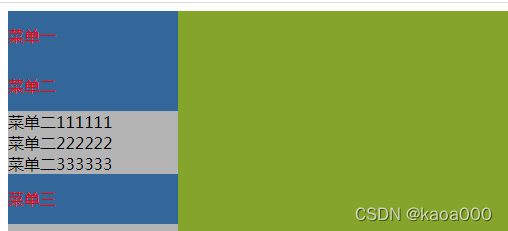
?
<html lang="en">
<head>
<meta charset="UTF-8">
<title>Title</title>
<script src="jquery-3.6.0.js"></script>
<script>
function show(self) {
$(self).next().removeClass("hide");
$(self).parent().siblings().children(".con").addClass("hide");
}
</script>
<style>
.menu{
height: 500px;
width: 30%;
background-color: #b4b4b4;
float: left;
}
.content{
height: 500px;
width: 70%;
background-color: #84a42b;
float: left;
}
.title{
line-height: 50px;
background-color: #336699;
color: red;
}
.hide{
display: none;
}
</style>
</head>
<body>
<div class="outer">
<div class="menu">
<div class="item">
<div class="title" onclick="show(this);">菜单一</div>
<div class="con">
<div>菜单一111111</div>
<div>菜单一222222</div>
<div>菜单一333333</div>
</div>
</div>
<div class="item">
<div class="title" onclick="show(this);">菜单二</div>
<div class="con hide">
<div>菜单二111111</div>
<div>菜单二222222</div>
<div>菜单二333333</div>
</div>
</div>
<div class="item">
<div class="title" onclick="show(this);">菜单三</div>
<div class="con hide">
<div>菜单三111111</div>
<div>菜单三222222</div>
<div>菜单三333333</div>
</div>
</div>
</div>
<div class="content"></div>
</div>
<script>
</script>
</body>
</html>Tab菜单切换:
<html lang="en">
<head>
<meta charset="UTF-8">
<title>Title</title>
<script src="jquery-3.6.0.js"></script>
<style>
*{
margin: 0;
padding: 0;
}
.tab_outer{
margin: 0 auto;
width: 70%;
}
.menu{
background-color: #b4b4b4;
line-height: 40px;
}
.menu li{
display: inline-block;
}
.content{
background-color: #84a42b;
border: 1px solid greenyellow;
height: 300px;
}
.hide{
display: none;
}
.current{
background-color: #c0cddf;
color: yellow;
border-top: solid 1px rebeccapurple;
}
</style>
</head>
<body>
<div class="tab_outer">
<ul class="menu">
<li xxx="c1" class="current" onclick="tab(this);">Tab页一</li>
<li xxx="c2" onclick="tab(this);">Tab页二</li>
<li xxx="c3" onclick="tab(this);">Tab页三</li>
</ul>
<div class="content">
<div id="c1">页一内容</div>
<div id="c2" class="hide">页二内容</div>
<div id="c3" class="hide">页三内容</div>
</div>
</div>
<script>
function tab(self) {
// $(self).addClass("current");
// $(self).siblings().removeClass("current");
$(self).addClass("current").siblings().removeClass("current")
var s ="#" + $(self).attr("xxx");
$(s).removeClass("hide").siblings().addClass("hide");
}
</script>
</body>
</html>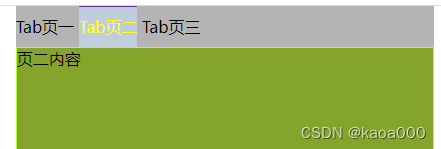
?属性操作:
attr()与removeAttr():
<html lang="en">
<head>
<meta charset="UTF-8">
<title>Title</title>
<script src="jquery-3.6.0.js"></script>
</head>
<body>
<input id="ck" type="checkbox">
<script>
$("#ck").attr("id"); //取属性值
$("#ck").attr("id","eee"); //修改属性值
$("#eee").attr("checked","true"); //修改checked值为true,即选中
$("#eee").removeAttr("checked"); //删除checked属性,相当于取默认值,即false
</script>
</body>
</html>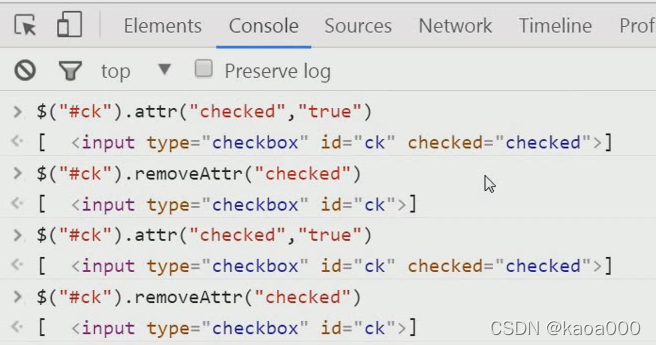
?prop()与removeProp()
<html lang="en">
<head>
<meta charset="UTF-8">
<title>Title</title>
<script src="jquery-3.6.0.js"></script>
</head>
<body>
<input id="ck" type="checkbox" checked="true">
<script>
$("#ck").attr("id"); //取属性值
$("#ck").attr("id","eee"); //修改属性值
$("#eee").attr("checked","true"); //修改checked值为true,,没有checked属性就添加,即选中
$("#eee").removeAttr("checked"); //删除checked属性,相当于取默认值,即false
var s = $("#ck").prop("id"); //取属性值
$("#ck").prop("id","wes"); //修改属性值
$("#wes").prop("checked","true");//修改checked值为true,,没有checked属性就添加,即选中
$("#wes").removeProp("checked","false");
//删除checked属性,相当于取默认值,即false ,这个测试没成功
</script>
</body>
</html>关于each()方法,遍历:
li = [10,20,30,40];
$.each(li,function (i,x) {
console.log(i,x);
//each方法,第一个参数是要遍历的数组,第二个参数是一个函数
//即要使用这个函数对遍历进行处理,这个函数的第一个参数i数索引值,第二个参数x是值
})
dic = {name:"nnnnn",sex:"male"};
$.each(dic,function (i,x) {
console.log(i,x);
// 遍历字典,i为key,x为value
})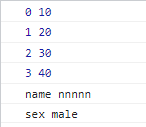
?each方法实现反选功能:
html lang="en">
<head>
<meta charset="UTF-8">
<title>Title</title>
<script src="jquery-3.6.0.js"></script>
</head>
<body>
<input type="button" value="all" onclick="selectall();">
<input type="button" value="cancelall" onclick="cancelall();">
<input type="button" value="reverse" onclick="reverse();">
<hr>
<table>
<tr>
<td><input type="checkbox"></td>
<td>1111111</td>
</tr>
<tr>
<td><input type="checkbox"></td>
<td>222222</td>
</tr>
<tr>
<td><input type="checkbox"></td>
<td>33333333</td>
</tr>
</table>
<script>
li = [10,20,30,40];
$.each(li,function (i,x) {
console.log(i,x);
//each方法,第一个参数是要遍历的数组,第二个参数是一个函数
//即要使用这个函数对遍历进行处理,这个函数的第一个参数i数索引值,第二个参数x是值
})
dic = {name:"nnnnn",sex:"male"};
$.each(dic,function (i,x) {
console.log(i,x);
// 遍历字典,i为key,x为value
})
$("table tr").each(function () { //each的另一种用法
console.log($(this).html());//列出每个tr标签
})
function selectall() {
$("table :checkbox").each(function () {
$(this).attr("checked","true");
})
}
function cancelall() {
$("table :checkbox").each(function () {
$(this).removeAttr("checked");
})
}
function reverse() {
$("table :checkbox").each(function () {
// if($(this).attr("checked")){
// $(this).removeAttr("checked");
// }else{
// $(this).attr("checked","true");
// } //上面的attr使用反选有问题
if($(this).prop("checked")){
$(this).removeProp("checked");
}else{
$(this).prop("checked","true");
}
})
}
</script>
</body>
</html>插入元素:
append与appendTo方法:注意调用的主体,方法的参数。
<html lang="en">
<head>
<meta charset="UTF-8">
<title>Title</title>
<script src="jquery-3.6.0.js"></script>
</head>
<body>
<div id="div1">
<p>hello 11111</p>
</div>
<p>fdsafsafsda</p>
<p class="p1">hello pppppp</p>
<script>
var ele = $(".p1");
// $("#div1").append(ele);
//append()方法在元素中插入元素,即作为孩子插入,在最后孩子后插入
//结果是在<p>hello 11111</p>后添加<p class="p1">hello pppppp</p>
//测试结果显示:append实际上是移动,将<p class="p1">hello pppppp</p>移动到<p>hello 11111</p>后
ele.appendTo($("#div1"));
//ele元素移动到$("#div1")标签中,作为最后一个孩子
</script>
</body>
</html>类似的prepend和prependTo方法,是在第一个孩子前插入。
前面四个都是内部插入。
外部插入:after()、before(),这两个方法是在元素同级的后面或前面插入,即成为后或前相邻的兄弟,insertAfter()、insertBefore(),这两个方法的效果同两个方法,不同的是调用的主体。
A.after(S)在A元素后插入S元素,A.before(S),在A元素前插入S元素
S.insertAfter(A),将S插入在A的后面,S.insertBefore(A),将S插入在A的前面。
复制:clone()方法,删除:remove()方法,清空:empty()方法
<html lang="en">
<head>
<meta charset="UTF-8">
<title>Title</title>
<script src="jquery-3.6.0.js"></script>
</head>
<body>
<div id="outer">
<div class="item">
<input type="text">
<input type="button" value="+" onclick="fun1(this);">
</div>
</div>
<p>ooooooooooooooooooo</p>
<hr>
<div class="div2">
<p>hhhhhhhhhhhhhhhhh</p>
</div>
<script>
function fun1(self) {
var clone_t = $(self).parent().clone();
clone_t.children(":button").val("-").attr("onclick","fun2(this)");
$("#outer").append(clone_t);
}
function fun2(self) {
$(self).parent().remove();//删除元素
//相对应的,有一个empty()方法,是清空的意思,是清空元素中内容,而元素还在
}
$(".div2").remove();
// $(".div2").empty();
</script>
</body>
</html>remove()后:
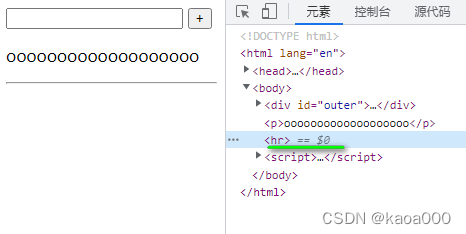
empty()后:
 ?
?
?
后台管理的页面布局示例:
position:absolute,定位时可以定位到右下角,滑轮滚动时,跟着滑动,不固定。
利用position:absolute + overflow:auto
获取滚轮滚动的高度:$('body').scrollTop()
?左边菜单跟随滚轮滑动,内容的改变而选择或取消:
<!--<!DOCTYPE html> <!–如果加上这一句,scrollTop就不好用–>-->
<html lang="en">
<head>
<meta charset="UTF-8">
<title>Title</title>
<script src="jquery-3.6.0.js"></script>
<style>
.menu{
position: absolute;
left: 200px;
top:48px;
bottom:0;
width:120px;
border: 1px solid red;
}
.menu a{
display: block;
}
.activemenu{
background-color: #336699;
color: white;
}
.guding{
position: fixed;
top:0;
}
</style>
</head>
<!--<body style="margin: 0;" onscroll="gundong();">-->
<body style="margin: 0;">
<div style="height: 48px;background-color: #303a40"></div>
<div id="menu" class="menu" >
<a timu="1">菜单一</a>
<a timu="2">菜单二</a>
<a timu="3">菜单三</a>
<a timu="4">菜单四</a>
</div>
<div id="content" style="position: absolute;left: 320px;right: 100px;bottom: 0;top: 48px; border: 1px solid gray;">
<div zhang="1" style="height: 500px;background-color: #336699">菜单一内容</div>
<div zhang="2" style="height: 900px;background-color: green">菜单二内容</div>
<div zhang="3" style="height: 1000px;background-color: rebeccapurple">菜单三内容</div>
<div zhang="4" style="height: 800px;background-color: greenyellow">菜单四内容</div>
</div>
<div onclick="gotop();" style="cursor:pointer;position: fixed;right: 0;bottom: 0;width: 50px;height: 50px;background-color: gray;color: white;border: 1px solid red;">返回顶部</div>
<script>
function gotop(){
$(window).scrollTop(0);
}
window.onscroll = function gundong() {
var scrollTop_t = $("body").scrollTop();
//scrollTop()要想起作用,第一行不能有<!DOCTYPE html>
//scrollTop()加上一个参数,就是设置滚轮的高度,否则是获取
if(scrollTop_t>48){
$("#menu").addClass("guding");
//向上滚动48px,就给menu加一个guding的类型,将菜单栏固定住
}else{
$("#menu").removeClass("guding");
$("#menu a").removeClass("activemenu");//当重新滚动到最顶端时,所有菜单选定的取消,即菜单一取消
}
$("#content").children().each(function () {
var eleTop = $(this).offset().top;
var winTop = eleTop - scrollTop_t;
var winBottomTop = eleTop + $(this).height() - scrollTop_t;
var docHeight = $(document).height();
var winHeight = $(window).height();
if(docHeight - winHeight == scrollTop_t){
$("#menu a:last").addClass("activemenu").siblings().removeClass("activemenu");
}else {
if(winTop<=0 && winBottomTop>0){
//当前内容对应的菜单应该被选中
var a = $(this).attr("zhang");
$("#menu a[timu='" +a+"']").addClass("activemenu").siblings().removeClass("activemenu");
return;
}
}
})
}
//offset()获取当前元素距离文档顶部的距离
//height()获取当前元素自身的高度
//innerHeight()获取元素内部区域高度(包括补白、不包括边框)自身高度+padding
//outerHeight()获取元素外部高度(默认包括补白和边框),设置为true时,计算边距在内
//outerHeight(false) 自身+padding+border,outerHeight(true) 自身+padding+border+margin
//整个文档的高度=document高度,$(document).height()
//窗口的高度 $(window).height
//滚动的高度
</script>
</body>
</html>